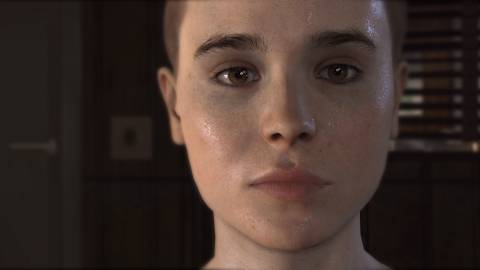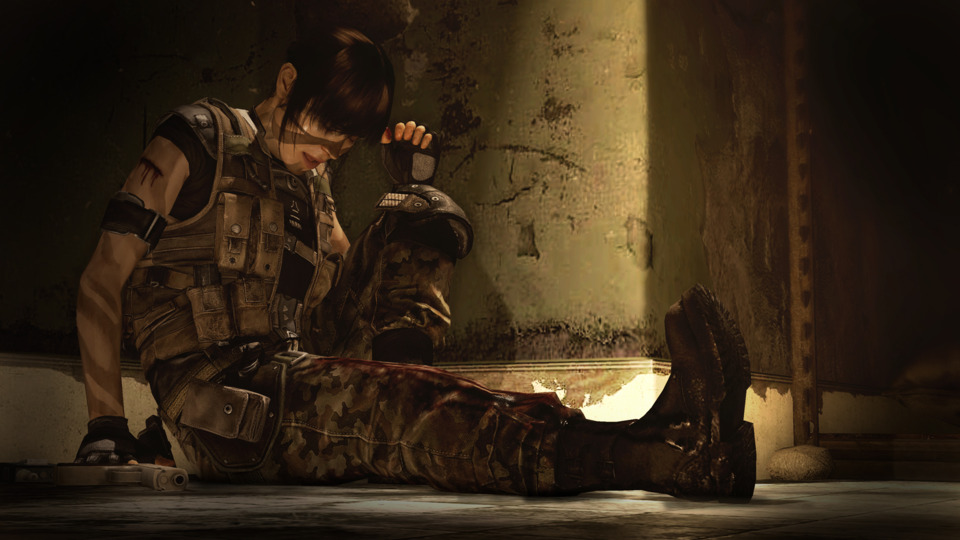David Cage has gone and made his game again.

If you've played either Indigo Prophecy or Heavy Rain, you know precisely what that means. Beyond: Two Souls is a great deal like those two games in terms of mechanics and design ideals. Cage and his team at Quantic Dream have dedicated themselves to a laserlike focus on melding cinematic storytelling with the interactivity of video games, and Beyond is perhaps the best realized version of those ideals and mechanics. In Beyond, Cage has developed a game that shows far greater production value, offers significantly better acting talent, and tells a far more coherent story than anything his studio has tried previously. And yet your enjoyment of Beyond will once again depend entirely on how willing you are to get behind what a David Cage game unwaveringly is, not to mention how willing you are to forgive some frequently hokey, and downright maddening plot nonsense.
The Two Souls part of Beyond's title refers to the dual entities you control throughout the game. Primarily, you're in control of Jodie (Ellen Page), a woman born with an equally exceptional and unfortunate gift. She possesses an attachment to an unknown spirit she refers to as Aiden. Aiden's existence is, for many years, inexplicable to her. She was born with this spirit tethered to her, and in limited capacities, she can make Aiden perform specific tasks. By and large though, Aiden is an enigma to her and everyone around her, which makes her existence both enticing and worrisome to the various forces that take an interest.
Beyond takes place over the course of 15 years of Jodie's life. The events unfold in nonlinear fashion, darting wildly between the trials of her early childhood, to the many years she spent in relative confinement in a government lab, as well as the years she spent both working as an operative for the CIA, and running from the agency as a fugitive. Jumping from time period to time period isn't quite as confusing as it might sound. Cage's script is mindful about how it metes information out over time, establishing characters and situations with a (mostly) light touch. Cage actually does a pretty good job of making Jodie's character development feel at least somewhat organic, considering the bizarre situations she's thrust into over the course of the game.
And let me tell you, some of that stuff is completely, utterly insane. It's hard to know where to start when trying to pinpoint where the line between the acceptably ridiculous and the nonsensically ridiculous exists for Beyond: Two Souls. This is, after all, a game about a girl and her ghost who spend years under the care of a division of the government expressly designed for paranormal investigation, find themselves recruited into the CIA for black ops missions (that require ghost powers to execute, of course), and then go on the run all David Banner-style, hunted by both the government and various other entities that come from "the other side" (which the game refers to as the "Infraworld"). In between all of that, Jodie scares off her adoptive parents, befriends the obsessive scientist assigned to her case (Willem Dafoe) and his assistant (Kadeem Hardison), ruins a birthday party, fights off would-be rapists, learns close-quarters combat, assassinates foreign targets, kills a lot of cops, lives with homeless people, falls into a coma, gets mixed up in the supernatural happenings around a Navajo family's ranch, goes to fake China for a while, sort-of falls in love a couple of times, and eventually discovers the truth about herself and Aiden while saving us from our own self-created destruction.

All that over the course of maybe 10-to-12 hours. Suffice it to say, Beyond tries to cover a lot of ground, and sometimes falls into deeply silly territory while trying to maintain some semblance of storytelling balance. Cage's writing has been the subject of much derision in the past, and Beyond has more than its share of laughable dialogue and painfully underdeveloped story situations. Every chapter has its own unique story element, but some feel more out of place than simply unique. And though the ending is less risible than the sort of nonsense that concluded previous Quantic Dream games, the last few chapters try to wring a lot of drama out of not much build-up, resulting in a series of available endings that don't all feel entirely earned.
And yet, despite all this, Beyond works considerably better than any Quantic Dream game I've played to date. The singular focus on Jodie and Aiden's trials and tribulations benefits the admittedly bizarre story the game is trying to tell. Sometimes that focus betrays the game's attempts at conflict--what few villain characters do rear their head are mostly undeveloped, throwaway baddies who fail to leave much of an impression--but more often it helps ground the story in something at least vaguely resembling an identifiable reality. If you're able to just kind of roll with all the crazy ghost stuff, the shadowy government happenings, and the game's nebulously defined concept of the spirit realm, Beyond actually works, mostly by virtue of how well the interactions between its individual characters play out.
The performances are a huge part of why that's the case. Beyond marks the first time Quantic Dream has gone for full performance capture in one of its games, meaning that the actors who play these characters actually acted out each scene in a studio, versus having their characters' movements animated by Quantic Dream by hand. The result, especially in the realm of facial capture, is genuinely impressive. Characters are expressive, nuanced, and just shy of that uncanny valley of creepiness. Body movements, especially when two characters are touching one another, are more hit-or-miss, with some sequences (especially anything particularly romantic) falling uncomfortably flat. Still, the vocal performances from the entire cast are terrific, especially Page, Dafoe and Hardison, who each bring far more humanity to their characters than any of the actors Quantic Dream has employed before. Page is especially good, primarily given the amount of clumsy, cliched dialogue she's forced to shout throughout the game. She keeps you interested in Jodie's plight even when the game itself frequently seems to want to wander off on some other tangent entirely.

Of course, you won't be able to get into Beyond: Two Souls unless you're a subscriber to Quantic Dream's minimalist philosophy of game design. Like Indigo Prophecy and Heavy Rain, Beyond is less concerned with typical game action than simply providing interactive contexts for you to periodically engage. You do control Jodie the majority of the time, and moving her around can sometimes be a bit of a chore, especially if you have to drop yourself in and out of cover quickly. Other than basic movement, you mostly perform actions by tapping prompted buttons that appear on screen, holding them, pressing them in particular successions, or by tapping the right analog stick in various directions. There are some Sixaxis motion controls as well, though few of them require much more action than simply tilting the controller to one side or the other, or shaking it up and down now and again.
All this stuff ranges from the mundane to the reflexive. Tapping the stick in one situation might just lead to you picking up a beer, at which point you'll have to tap the stick again to drink it. In a completely different situation, Jodie might be fighting off three or four cops, in which case time will slow down right before an attack, and you'll have to tap the stick in the direction of oncoming attacks to block them, while tapping again in the direction Jodie is punching or kicking to strike.
Other times, you'll be controlling Aiden. Being an incorporeal entity, Aiden's interactions with our world are more limited. Most often you'll just be interacting with highlighted objects by pulling back on both sticks and letting go. This can do everything from simply knocking an object over, to flinging a table across a room or knocking a person straight out. You can also possess specific people, which will allow you take control of their bodies, and in some cases, you can just a kill an enemy outright. Unfortunately, a lot of this is arbitrary. Who you can kill, possess, or ignore is entirely decided by what's convenient for the scene, versus any sort of logical sense. So, of course you can kill the sniper that's sitting 20 feet away from everyone, but you can't kill the guy you need to possess to trigger the next gameplay sequence, nor any of the other random soldiers needed for the next scripted sequence. Similarly, Aiden has the ability to shield Jodie from attacks and impending danger, but can only apparently do this when it's convenient for the plot. Like, why is Jodie able to use Aiden to save herself from dying after jumping out of a burning building, but can't make Aiden shield her from the throngs of Somali soldiers looking to kill her earlier on?
This stuff generally works best when Aiden is allowed a bit more freedom in his objectives. In the birthday party scene I mentioned earlier, you'll end up in a scenario where you can essentially torment a bunch of nasty teenagers for quite a while. That starts out innocently enough, with Aiden flinging furniture around a bit and cracking a few windows, but as time goes on, his attacks become much darker. Before I'd even realized it, I had begun flinging knives at one kid, and actually set the house aflame. Interestingly, I could have chosen to just leave the house, instead of screwing with these kids who had previously tormented me. Likewise, I could have ended the spookin' without actually stabbing anyone, but the end result of the scene would have pretty much played out the same way. Beyond does dabble in player choice, with certain scenarios presented that can be handled either by divergent actions or dialogue choices. But the game isn't really about that stuff, necessarily. Multiple endings do pop up, but they aren't reliant on particular choices you've made throughout the game, so much as they are just another choice to make late in the proceedings.

As I sit here, trying to assemble all of these previous paragraphs into a traditional concluding recommendation, I find myself struggling to come up with a simple answer as to whether you should play Beyond: Two Souls. Maybe there is no simple yes/no recommendation to give this game. For every part of it that comes together almost perfectly, there's another that's stricken by needless cliche or undercooked gameplay. Taken on a purely technical level, Beyond: Two Souls is by far the best game Quantic Dream has yet produced. Conversely, Beyond can be as ridiculous as any of the most ridiculous moments in Indigo Prophecy or Heavy Rain, and it can feel as sparsely interactive as either of those games could as well. It is unmistakably, unambiguously a David Cage game, with all the potential caveats and potential boons that label comes along with.
All I can say is that in spite of its sometimes dopey script, its slavish dedication to control mechanics that don't always quite fit, and its unrelenting desire to stuff in as many obvious blockbuster movie references and cliches as a single game can hold, I enjoyed the experience of playing Beyond: Two Souls. It certainly won't change the minds of anyone not interested in Cage's particular brand of game, but for my money, I think Cage at his best still earns your attention by sheer virtue of what he aims for, and sometimes even manages to capture, if only for fleeting moments and sequences.
